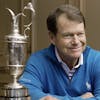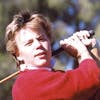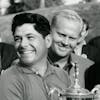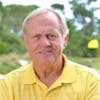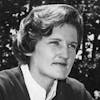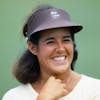Betty Burfeindt - Part 1 (The Early Years)
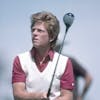
In this episode we sit down with LPGA Championship winner Betty Burfeindt, reminiscing about her golfing experiences during her early days as she shares vivid memories of thrilling playoffs, her first win, and the evolution of her golfing equipment.
The conversation begins with insights into how sponsors protected players during games and the significance of rapport with fellow players. Bruce and Betty also discuss the amusing antics of celebrities like Bill Murray and Dean Martin during events.
Betty opens up about her title as Golf Magazine's Most Improved Golfer in 1972 and takes listeners through her journey from her nerve-wracking playoffs in the Pompano Beach Classic to her victory at Midlane Country Club.
The trio also explores the era's golfing equipment, comparing the smaller persimmon-headed clubs with modern technology, and reflecting on PowerBilt's influence on the game. With recollections of playing with legends like Sandra Palmer and the ups and downs of changing putters mid-tournament, this episode is a treasure trove of golf history.
Whether you're an aspiring golfer, a seasoned veteran, or just love the game's history, this episode is a delightful walk down memory lane.
Don't forget to subscribe to "FORE the Good of the Game" on Apple or Spotify, and stay tuned for more fascinating stories from the world of golf, "FORE the Good of the Game."
Follow our show and/or leave a review/rating on:
Our Website https://www.forethegoodofthegame.com/reviews/new/
Apple Podcasts https://podcasts.apple.com/us/podcast/fore-the-good-of-the-game/id1562581853
Spotify Podcasts https://open.spotify.com/show/0XSuVGjwQg6bm78COkIhZO?si=b4c9d47ea8b24b2d
Google Podcasts https://podcasts.google.com/feed/aHR0cHM6Ly9mZWVkcy5idXp6c3Byb3V0LmNvbS8xNzM3Mjc1LnJzcw
About
"FORE the Good of the Game” is a golf podcast featuring interviews with World Golf Hall of Fame members, winners of major championships and other people of influence in and around the game of golf. Highlighting the positive aspects of the game, we aim to create and provide an engaging and timeless repository of content that listeners can enjoy now and forever. Co-hosted by PGA Tour star Bruce Devlin, our podcast focuses on telling their life stories, in their voices. Join Bruce and Mike Gonzalez “FORE the Good of the Game.”
Thanks so much for listening!
Music playing 00:00
Mike Gonzalez 00:15
Welcome to another edition of FORE the Good of the Game and Bruce Devlin. For our 78th interview this morning, we've got another LPGA major champion with us.
Devlin, Bruce 00:25
We do she's got a lot of other attributes to loves photography is quite good at it. Does some art murals, been a teacher at a golf club in Rancho Mirage for I guess, 30 somewhere maybe not teaching all the time, but there for 30 odd years. And the winner of the 1969 LPGA Championship along with four LPGA victories and it is indeed a pleasure to have Betty Burfeindt. He with us this morning. Thank you for joining Mike and I.
Burfeindt, Betty 00:57
Thank you both. I appreciate it.
Mike Gonzalez 01:00
So Betty, as you know, we've talked about, we're here to tell your life story. And as I understand your roots go back to New York, New York. So tell us about life growing up as a child in New York City or in the New York area.
Burfeindt, Betty 01:15
Well, yeah, I was born in Manhattan, but we didn't stay there long. We moved to New Jersey Wycoff, New Jersey, and not sure how old I was then. Yeah. Then my parents divorced. When I was nine. And my mom, my sister and I, we moved to upstate New York. She knew of a good friend up there. So we settled right there and had our house built. We're in the woods in the rural area. And it was called on at that town of Spencer County. And then we moved to Canaan which is just one mountain over it's really the same area. And that's that's basically where I grew up high school. play golf in Massachusetts. We're real close to the border there. Yeah. So like two miles from the line. And I played all my golf in Pittsfield, Massachusetts. And that's where I developed more golf, more errors, more whatever.
Mike Gonzalez 02:22
Well, how did how did you get exposed to the game of golf at a young age?
Burfeindt, Betty 02:27
My stepdad played, and he wanted to get my mom to play again, because she played too, but gave it up for a while. And that's when I started I got my clubs, Patty Berg Specials. And I played at this nine hole Golf Course where my stepdad was, worked at GE, and Pittsfield, and they had this Golf Course GE Athletic Club was nine holes, no bunkers, no trees. Just some short grass out there every other two or three yards. And that's basically where I learned and I played a lot of best-ball tournaments with a friend of mine who also played at that Golf Course. So we grew up together playing a lot of tournaments, mainly best-balls.
Devlin, Bruce 03:19
You know, we've all we talked to all our folks about, you know, they are they're all great golfers, obviously, but a lot of them have history and playing Team sports too. And you were you were quite a quite an athlete in your young days. Basketball, volleyball, softball, field hockey goodness. I was you were busy.
Burfeindt, Betty 03:41
Yeah, I couldn't play golf, though. I tried to join the men's team and they wouldn't let me. So we just had an intramural team that we played maybe once a week and the seasons shored up there. I played in Cortland, just south of Rochester, which just had the PGA right. So the snow flies early. Yeah. In that area, and late. Yeah. comes early and stays late.
Mike Gonzalez 04:07
So all the athletics. I assume when you picked up the game of golf, you're already playing some other sports. Correct? Yeah. And what what got you gravitating toward golf at some point?
Burfeindt, Betty 04:20
What I couldn't continue the sports I was playing in college after I graduated. So I was getting really interested in the game. And I was getting down to a low handicap. And I studied phys ed in college. So I had to get a job. And I said, Well, let's go down to Florida. And then I can continue practicing what I teach. And I taught for a year and two months and then resigned and decided I'm going to join the tour. I've had it. Let's do it.
Mike Gonzalez 04:50
One before we let us turn professional, we'll still come back to some of the early days. How did you get some of your early teaching is there one teacher in particular that really stands
Burfeindt, Betty 05:01
I never had a lesson until I joined the tour
Mike Gonzalez 05:04
that amazing. So how did how did you learn where you're pretty good? visualizer? Did you have good observation powers?
Burfeindt, Betty 05:12
I learned visually, right? And I teach visually, too most of the time. But I kept wanting to be paired with the best golfer at the club and he was a young guy. And why not copy the best one. He was like a two, two or three handicap. So I hung out with him and learned as best I could. So that was the beginning.
Devlin, Bruce 05:34
Any TV watching any favorite that you liked always,
Burfeindt, Betty 05:38
always watching Jack Nicklaus? Yeah, of course.
Devlin, Bruce 05:43
His name comes up quite often, I might tell you that too, as you can. Well imagine. Yeah. Right. Great player,
Mike Gonzalez 05:51
pretty good swing to mimic as well. But what about other other visual ways of learning the game? I remember at least when I grew up back in the 60s, it was the golf magazines. I'd clip out all those one page illustrated lessons. And that was kind of my scrapbook for chipping. I had a section on chipping a section on driving section on putting.
Burfeindt, Betty 06:12
Good. I didthe foldouts. Yeah. It had a Swing sequence. Oh,
Devlin, Bruce 06:17
yeah. So Barry, Mike can do it. Mike can do a lesson now in chipping, too. He's he's one of those one-hand chippers. If you like, I can take a look back. But he is.
Mike Gonzalez 06:31
That's what you do. And you can't chip with two anymore
Burfeindt, Betty 06:35
that is to
Mike Gonzalez 06:37
go with what gets you results. But anyway. So tell us a little bit about how your game developed self taught, you know, observing, as you say, did it just sort of develop gradually or where there's some step changes at certain ages where you really picked up something and got better at?
Burfeindt, Betty 06:55
No, it was just gradual. I didn't have any epiphanies that I could think of was just gradual working on it, practicing a lot. Hitting a lot of balls. And I joined I didn't join I worked at this club and Pittsfield Waucona country club. Tommy Toski was the pro. And that allowed me to practice there and play without having to pay. That's good. But the practice range was small and you had to shag your own balls. Yeah, go pick them up. Yeah. So it made me want to hit him straighter. So I didn't have to spray them all over the place.
Mike Gonzalez 07:36
So you probably had your own shag balls then too.
Burfeindt, Betty 07:38
Oh, absolutely. bagful. Right.
Mike Gonzalez 07:42
I remember Al Geiberger telling us that he put he put nail polish on his balls to distinguish his from others.
Burfeindt, Betty 07:50
Good idea. Yeah. Well, that was the beginning of having a market golf ball wasn't?
Mike Gonzalez 07:55
Well, it sure was. Yeah. You know, you mentioned sort of the lack of, of opportunities for women back in the day. As you can imagine having talked out to probably 31 of your peers from the LPGA Tour. They share the same stories, at least the ones that are of the later vintage, they share the same stories about pre Title Nine. No opportunity to play high school golf. Maybe on the boys team, maybe not. In college. No, no women's teams. Maybe they got to play with the men. Maybe not. It was just a different time, wasn't it?
Burfeindt, Betty 08:30
Oh, absolutely. Yeah, it was scraping, scrape anything together, you could find you know, so I want to join the boys team just because they played at a Country Club. And where we played for the college intramurals. You know, the first hole, the green behind the green were a bunch of cows. So you can imagine? What kind of course this was
Devlin, Bruce 08:58
so after after your your teaching in high school buds, high school phys ed in Florida, you just said okay, I'm going to go to the tour that was in 69. Yes, yeah. So fill us in on the early days on the tour.
Burfeindt, Betty 09:18
While I was scared out of my mind, the first first tournament was in Wheeling, West Virginia. And I think I finished 17th Well, there weren't many at that time. Betsy Cullen, I remember playing with her. So that was the beginning and then on to the next. So that I might put in here that for me to join the tour. I asked my parents to sponsor me or to give me some money to start. And they didn't really want me to do it. Because I didn't have dedicated income, constant income and they were fearful of that for me. So my grandmother gave me $500 That's how I that was a lot.
Mike Gonzalez 10:03
Yeah, yeah. Well, the the path you went down to get to the tour sounds a lot like the path that a couple of our guests just in the past couple of weeks follow Jerilyn Britz taught as well, physical education five years in high school three years at the college level before she turned pro at a little later age. And then Sandra Palmer was a teacher down Arlington, Texas for a year before she went on tour.
Burfeindt, Betty 10:27
Yeah. Well, it's just a means to an end. Yeah, I love sports so much. I was majored in science, but I didn't want to teach in a classroom. So
Mike Gonzalez 10:40
yeah. So life on the road in those early years. You have some pals that you kind of you kind of caravan with back in the day.
Burfeindt, Betty 10:49
Oh, yeah. We had our caravan we had the one on the middle. The one on the front. Would we had CB's also, Oh, okay. We would let people back smokey on the right. Watch it. And we had little signals to let everyone know I need gas or let's stop to eat. So we'd do a fill up, fill up and empty
Mike Gonzalez 11:14
The empty was the most important one.
Burfeindt, Betty 11:18
Absolutely.
Mike Gonzalez 11:19
So what was your CB handle?
Burfeindt, Betty 11:22
putt putt?
Mike Gonzalez 11:23
putt, putt? You got the putt putt here?
Burfeindt, Betty 11:26
Yeah. Yeah. What's your 20?
Mike Gonzalez 11:30
Remember that I remember you remember that song that came out about CB years? Oh, yeah. Convoy Convoy. That was it. I heard that on the radio this just the other day. And it reminded me of some of these discussions we've had with you lately. Yeah, yeah. Your CB radios and Caravaning from town to town?
Burfeindt, Betty 11:50
Well, and it was a safety factor for women. I thought we we had a way to communicate with someone if we were in trouble.
Devlin, Bruce 12:00
So Betty, you said you didn't have your first lesson until you went on the tour. So fill us in on who was that person?
Burfeindt, Betty 12:08
John Revolta was my first teacher in 71.
Devlin, Bruce 12:16
He touched a lot of people?
Burfeindt, Betty 12:19
Yes, he did. And he had hands that were so big. That he could take his right hand and his back to the hole. And chipping or pitching, hold, hold the shaft. My shot and a chip blindfolded and darned if it didn't go in. I mean, he could do that was was such finesse. And I just go for the ride. It's Oh, do it again, John, that was so good.
Devlin, Bruce 12:44
Very interesting. Yeah, he was good.
Mike Gonzalez 12:47
His name has come up a lot on discussion. So I'm sure he touched, he did touch a lot of lives. You had you had the health issue that first year on tour, how did that impact you?
Burfeindt, Betty 12:59
Actually, it was a 72nd tour. Going on to the third maybe I had a hyperthyroidism and it was bad enough where they had to operate and take it out. And they only took four fifths of it out and left. Whatever they left. I was good to go didn't need any medication for a couple of years. But it kept me off tour for the next six weeks when I was going crazy.
Mike Gonzalez 13:31
So how long did it take you to sort of get comfortable out there, you know, having learned all the courses known how to get to all these cities, just you know, sort of what life was like on the road and the LPGA Tour did it take a while.
Burfeindt, Betty 13:45
I think a couple of years. I always had that nervousness on the first tee and never did get rid of it. And Mickey Wright said, good if you're not nervous, you better leave. You're not gonna play well.
Devlin, Bruce 13:57
I agree with you. Yeah.
Mike Gonzalez 13:59
So Well, let's talk about let's talk about win number one, Bruce.
Devlin, Bruce 14:05
Yeah, I mean, him. Alabama.
Burfeindt, Betty 14:07
Yeah. Good ol' Birmingham. Crazy course. I liked that place. Yeah,
Devlin, Bruce 14:12
Won by two over Murle Breer. And we believe that was the inaugural event there at that club. I think Centennial Classic at Green Valley Country Club.
Burfeindt, Betty 14:25
Oh, yeah. Green Valley. Right. We played there a couple of years. Yeah. Yeah. The second year I lost a playoff. Yeah. Yeah.
Mike Gonzalez 14:37
Against the lady we mentioned earlier Sandra Palmer.
Devlin, Bruce 14:41
Yeah.
Burfeindt, Betty 14:43
On that one, oh,
Mike Gonzalez 14:43
sorry. No, I that was to Gloria Ehret wasn't it?
Burfeindt, Betty 14:46
Ehret and Clifford Ann Creed.
Mike Gonzalez 14:47
Yeah, Clifford Ann Creed and Gloria ended up winning that playoff. Right.
Burfeindt, Betty 14:50
Yeah, she made Birdie and Clifford and I lipped out. She won.
Mike Gonzalez 14:58
Well, by the way before we come to that first win because we want to talk a little bit more about it and what your memories are of it. Your name has come up a lot on our podcast. Did you have a lot of second places?
Burfeindt, Betty 15:08
Yes I did.
Mike Gonzalez 15:09
Well, there you go.
Burfeindt, Betty 15:10
Yes I did.
Mike Gonzalez 15:12
Because your name has come up an awful lot.
Burfeindt, Betty 15:14
Yeah, I had a lot of seconds. Two playoffs both lost. Yeah. Lost them both. Yeah. Second, second second.
Devlin, Bruce 15:23
Don't geel too bad about the playoff losses, though, Betty because we've we've kept a running record of, of all of these great and wonderful players that we've talked to over the last couple of years. And they all men and women, most of them have a negative as far as winning, they lose more than they win, which is quite remarkable when you think about it. Yeah. All the great players,
Burfeindt, Betty 15:51
right. A game of small failures that you have to handle.
Devlin, Bruce 15:57
Yeah, that's true.
Mike Gonzalez 15:59
It's mostly about losing, as opposed to winning golf is
Burfeindt, Betty 16:03
how you handle it Yeah, yeah, exactly.
Mike Gonzalez 16:07
But what do you remember about that first win in 1972 at Green Valley at the Birmingham Centennial Classic
Burfeindt, Betty 16:14
72 I think it was. I do remember a few holes toward the end. Actually, when it made the turn. I was three behind. And Carol Mann, Pam Burnette they were up there. But I birdied 15, 16, parred 17 and scraped a par in on 18. And I won by one I believe.
Mike Gonzalez 16:42
Actually, I think it's by two over over Murle Breer, you finished with a 71 year last round. So you must have had a pretty good back nine then.
Burfeindt, Betty 16:50
Yeah, yeah. Yeah, I was. So I'm in trouble on the front because I was behind by three. So I had to catch up somehow.
Mike Gonzalez 17:00
So what's that feeling like to bag that first when when that last putt drops?
Burfeindt, Betty 17:05
Oh, it's just something that most people don't get to experience. And I was fortunate enough to win that one. And I was staying at a private home that particular week. So that became a habit every year with those people. So it was kind of a tradition. Just going to town go into that town and winning the first one. I remember what happened coming home to the hotel. Had you know you have chauffeurs from the tournament take you back to your hotel. He ran out of gas. Oh, hey, slagging down anyone who's coming from the clubs. I need to get her to the Golf Course. I mean, that's funny. Oh my God. He was so embarrassed.
Mike Gonzalez 17:55
Well, you didn't wait long to validate that first one. You know, a lot of our guests wait years to you waited two weeks?
Burfeindt, Betty 18:03
Yeah. No, I gotta say that was harder than the first one. I think your second one is harder because yeah, you have to prove yourself. But it was at Desert Inn in Las Vegas. And you're playing with celebrities. Every day, there was one celebrity with you with the group for the leaders. And not playing alone. Pretty good. Right in there hanging in there. bounce the ball out of a pond up on the green. Everything was going well. Yeah. In the last day I played with Sammy Davis, Jr. and Judy Rankin. Yeah. Sammy Davis couldn't have been nicer. The poor guy was late to the tee. We had to give him a ball, a tee. a guy had to bring his shoes. It was it was just he was so wonderful. And at the end, he said, you know, Betty, I'll teach you how to dance if you show me how to putt I'd love to take him up on it.
Devlin, Bruce 19:00
He loved the game, of course, because he is he put his name to the golf tournament up in Hartford, Connecticut there for a while. Yes. He was a big fan of the game.
Burfeindt, Betty 19:09
Yes, he was. Absolutely
Mike Gonzalez 19:12
was as long as we're on the subject of celebrities. Let's talk about some of the other people you had a chance to play with.
Burfeindt, Betty 19:18
Oh, let's see I played with Ray Bolger. Sure. Yeah. Peter Falk.
Mike Gonzalez 19:24
Colombo,
Burfeindt, Betty 19:26
Joe DiMaggio.
Devlin, Bruce 19:31
Gary Morton.
Burfeindt, Betty 19:33
Well, we played in the winter all the time we played in Palm Springs. He lived in Palm Springs. Ah, George Shultz and I regret not getting a little scribble of one Snoopy or Charlie Brown or something.
Devlin, Bruce 19:50
What a talent. Yeah. What a teaalent that man had.
Mike Gonzalez 19:53
So not the Secretary of State but the famous cartoonist
Burfeindt, Betty 19:56
Yeah, yes.
Devlin, Bruce 19:59
I used to live at Pebble Beach. At one point in time. You did. No he did. Oh, okay, talking about Schultz. Yeah, yeah, he used to have a place at Pebble. Wow.
Burfeindt, Betty 20:15
Well, he loved the game.
Mike Gonzalez 20:16
what was Joe DiMaggio like to play with? What kind of golfer? Was he? First of all?
Burfeindt, Betty 20:20
He was very average, but he's very quiet. He hardly said anything. Yeah. Now
Mike Gonzalez 20:26
I remember sitting with him for the second half of the Super Bowl New Orleans that the Bears won Super Bowl 20. And kind of a long story, but I ended up sitting with Joe DiMaggio for the second half. That was a great experience.
Burfeindt, Betty 20:40
Did he talk to you?
Mike Gonzalez 20:41
He did, Yeah. But you sort of had to engage him he wouldn't necessarily initiate it right?
Burfeindt, Betty 20:46
Correct. Yeah, yeah, yeah,
Mike Gonzalez 20:49
well that had to be fun of course the Desert Inn great old place that no longer exists
Burfeindt, Betty 20:53
now nothing but casinos now. I guess Yeah.
Mike Gonzalez 20:59
Final place for win number two that was buy for over Kathy Ahern so it must have been a relatively leisurely walk up 18 for you
Burfeindt, Betty 21:07
never never know that you got you're gonna be nervous anyway, no matter what.
Mike Gonzalez 21:13
Yeah, I can't remember if there was water on that last hole or not. But if there's water involved, perhaps you would be a bit more nervous.
Burfeindt, Betty 21:18
There is water? Absolutely. Yeah, it was part five, I believe. Yeah, or five. But I had no idea. It was leading by four days. We didn't have scoreboards. So that's just word of mouth if anyone couldn't get by and say you're leading by three or four.
Mike Gonzalez 21:42
No, you gotta you gotta trust your caddy these getting the right information from somebody.
Burfeindt, Betty 21:48
That caddy he was a local boy. And he he didn't know golf at all. No, he was just a toder. Bag.
Mike Gonzalez 21:56
Yeah. Did you find that before? I guess at some point, just after that, the LPGA started allowing professional caddies, but I think in 1972, they probably didn't yet. How often was it that you just basically had a bag carrier
Burfeindt, Betty 22:10
almost every week, until well, after my second win. And then some of the guys would want to want to approach me and say, Can I caddy for you? Yeah, so I had two that were pretty steady. Over the years.
Mike Gonzalez 22:23
Yeah. So So you went from winning your first tournament? You know, was it a fluke? Was it can I repeat this two weeks later? Validation? They had to feel really good.
Burfeindt, Betty 22:35
Yeah. Yeah, that did. And it was a long, long tournament. I mean, with celebrities and Buddy Hackett was one of my celebrities, and he had been causing trouble with the other players in previous rounds.
Mike Gonzalez 22:56
Such as?
Burfeindt, Betty 22:58
Oh, he'd act silly, interfere with what you're doing and making snide remarks. But the sponsors came to me before we teed off and said, If he bothers you, we're gonna pull them Carol Mann shot 76 with them, and she was really upset. Boy,
Devlin, Bruce 23:17
yeah. Bruce, did
Mike Gonzalez 23:18
you? Did you ever run into that? Bruce, I mean, Betty, in case you didn't know, Bruce played with Dean Martin for 10 years in the Clambake and you know, at the Bing Crosby there? Were there any people causing issues? Bruce back then?
Devlin, Bruce 23:31
No, not really, you know, I mean, some some of the guys might, you know, it's a real attitude thing, though. Don't you think better? You know, if you can, if you have a rapport with them, even even if they get a little bit, you know, off color with whatever it might be. You know, if you can handle that as some people can't, you know?
Burfeindt, Betty 23:56
Yeah, I just stayed away, like kept away from that's good.
Devlin, Bruce 24:00
That's a good way to do it.
Mike Gonzalez 24:02
I guess an example, Betty for us would be we remember some of the crazy antics of Bill Murray at the Bing Crosby or at Pebble Beach. And we talked to Scott Simpson last week last show. And Scott played with him for years and years and absolutely adored the guy.
Burfeindt, Betty 24:19
I know he loved it. He had to have loved it to be with him that long. Yeah.
Mike Gonzalez 24:24
Yeah. So he just sort of embraced it and took it for what it was and they had a great time together.
Burfeindt, Betty 24:30
Well, that's a good attitude, right.
Mike Gonzalez 24:33
So you mentioned a couple of the playoffs. And before we get to those, just mentioned to our listeners that Betty was named Golf Magazine's Most Improved Golfer in 1972. So what was the basis for that. Give us sort of the background in terms of 71, 72 what happened?
Burfeindt, Betty 24:55
Well, I suppose scoring a lot better. Maybe two or three stroke. takes less than a year before plus over one to two tournaments. So that was mainly the reason
Mike Gonzalez 25:09
you don't mind getting that once, right? You want to maintain that lower average score, right? Yeah. Although Steve Stricker did I think he was a comeback Player of the Year two different times in his career? So, so who knows? Yeah, so we go to 1973. And you'd mentioned a couple of the playoffs you're involved in. First one being in Pompano Beach Classic. That was at Pompano Beach Country Club. And that was, as you'd mentioned, a playoff with Sandra Palmer.
Burfeindt, Betty 25:45
Correct.
Mike Gonzalez 25:46
And Sandra is one of the more recent inductees into the World Golf Hall of Fame. We visited with Sandra briefly lost internet connection and we'll pick it back up with her tomorrow. So what do you remember about that tournament?
Burfeindt, Betty 26:00
I remember having to birdie the last hole. That got me up on top. Sandra Palmer hadn't come in yet. So it turned out that she came in and we tied and went to playoff. And that's the one shot I regret was the second shot on that hole. I hit it into a bunker. Sandra was on the green about 20 feet. And I was in a bunker that look like dogs were having a hay day in there. footprints all over the place. And I was in a footprint. So, you got to figure it out and do something. I got it out. But Sandra birdied anyway,
Mike Gonzalez 26:44
so it was a par five.
Burfeindt, Betty 26:46
No, it was part four.
Mike Gonzalez 26:47
It was part four. Yeah, yeah. Yeah.
Burfeindt, Betty 26:52
That's the worst experience is the nervousness on a playoff. It's just it can be good news. Or it can be failure that you'll never forget.
Mike Gonzalez 27:04
Well, as as Bruce has mentioned, we've we've found through our research that these playoffs seem to be nothing more than a coin flip at the end of the day.
Burfeindt, Betty 27:14
Yeah, it's it is luck. And whose day is it? No, they just people have their day and you can tell they're gonna win are. You just know Gloria Ehret had been playing pretty well up to them. So she made birdie on that first playoff hole.
Mike Gonzalez 27:30
Yeah. This was the one at Birmingham. That's right to the year after you win. Clifford Ann Creed who by the way, Clifford Ann Creed has come up on the podcast an awful lot as well. And Gloria took that one with a birdie on the first is right. Yeah. What do you remember about that tournament?
Burfeindt, Betty 27:48
Well, of course, it was my first wind. So it was exciting. I had a lot of friends there because they were friends of the people we're staying with. And we just felt good support. And it was a it was a great atmosphere. Yeah, all the club members were terrific.
Mike Gonzalez 28:07
Well, after those two playoff losses, you did have a victory up near the Illinois/Wisconsin border. Bruce?
Devlin, Bruce 28:16
Yeah. The Child & Family Services Open At Midlane Country Club where you beat Debbie Austin and Laura Baugh.
Burfeindt, Betty 28:24
That was something Laura Baugh that was her first year.
Devlin, Bruce 28:27
She was gonna say she had to be young then
Burfeindt, Betty 28:29
oh, young rookie. And we were paired toward the back nine last last round. And she putted up four feet away. And she said I'll finish. I said what in the world? This rookie just finishing it from four feet when it really matters? And she'd knock it in? Wow. You know, I'd mark it from a foot. Tapping in from four feet. Oh, I think she bogeyed one hole coming in. So that's how I won.
Mike Gonzalez 29:01
You were four back I think coming into that last round and shot a smooth little five under to win.
Burfeindt, Betty 29:08
That was again one of those weeks and days that don't come too often but you just let it happen.
Mike Gonzalez 29:17
So what was going on with your game that week? Was at ball striking was that you were making everything you were looking at? What happened?
Burfeindt, Betty 29:24
No, it was ball striking. I was not going to close making the putts. So that's what was more fun than sinking longones for pars.
Mike Gonzalez 29:33
Yeah, well, we asked you about the seconds and you did have four second place finishes that year coming into this event. So you were ready to win.
Burfeindt, Betty 29:42
Yes. That's a good point. I didn't know it four then. Yeah.
Mike Gonzalez 29:46
Yeah. Yeah. You also changed your putter out for a mallet putter. You remember that?
Burfeindt, Betty 29:52
I do. I didn't stay with a very long though.
Mike Gonzalez 29:55
Yeah, I think you I think what you did you got rid of your mallet putter. During this event.
Burfeindt, Betty 30:01
Oh, good. I did. That's crazy. How stupid was that? Change your mental around? Well, you won the tournament. Yeah, I worked out. I used a Spalding putter, a blade. It was called a TPM Three, I think it was made out of gun metal. And to this day, there is no feel like acenter hit on that putter. It was wonderful. So, I still have it.
Mike Gonzalez 30:30
And it tells us a little bit about the equipment you were playing at this time in your career.
Burfeindt, Betty 30:35
At that time, I was playing PowerBilt, I think I joined PowerBilt and 72 and 72. And there were several of us on the staff. So I like PowerBilt. They're a great clubs.
Devlin, Bruce 30:52
They were good. Yeah.
Mike Gonzalez 30:54
Beautiful woods.
Burfeindt, Betty 30:55
Persimmon head. and uh, PowerBilt had the market
Devlin, Bruce 31:01
little different today, don't you think? Yeah. Oh, yeah.
Burfeindt, Betty 31:06
Yeah, small heads and wooden heads, yeah. But they had the best persimmon of any company. Yeah, they had the market down in Louisiana.
Mike Gonzalez 31:17
And I know at least on the men's side, maybe it's true of your side as well. But on the men's side, they're carrying those big orange bags. It was pretty easy to spot the PowerBilt guys out on tour. How about for you? Do you have a big orange bag as well?
Burfeindt, Betty 31:30
Yeah, Halloween? Yeah.
Mike Gonzalez 31:33
Where's Betty? verfied Oh, there's the orange bag. She's over on 13 Yeah, why orange and black? I
Burfeindt, Betty 31:41
don't know it. That's always it was always that color. They never changed out like Callaway now changes. Every other week. They change their back.
Mike Gonzalez 31:51
Yeah. And Bruce, you'll remember a lot of fine players back in PowerBilt. I canBilly Casper. Yeah, Fuzzy and Larry Mize played
Devlin, Bruce 32:02
with it.
Burfeindt, Betty 32:02
Miller Barber. Yeah.
Devlin, Bruce 32:04
A lot. A lot of really good players use their equipment. Yeah.
Burfeindt, Betty 32:10
The irons were so small. At that time, we didn't know any differently. But today I looked at them and I don't know how I ever Hit them. Smaller than a Jaws head on a wood. just small.
Mike Gonzalez 32:25
Thank you for listening to another episode of Fore the Good of the Game. Please, wherever you listen to your podcast on Apple and Spotify. If you like what you hear, please subscribe. Spread the word and tell your friends until we tee it up again. With the good of the game. So long, everybody.
Music playing 32:45
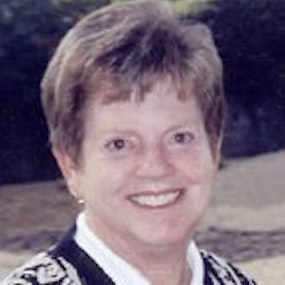
Burfeindt, Betty
Golf Professional
Betty Burfeindt (born July 20, 1945 in New York City) is a retired American golfer who played on the LPGA Tour. She attended Cortland State University in New York and her rookie season on tour was 1969.
Burfeindt won four times on tour, and her last was her only major championship, the LPGA Championship in 1976, in which she finished one stroke ahead of runner-up Judy Rankin.[2][3] Her two best years were 1972 and 1973, with consecutive fourth-place finishes on the money list. Burfeindt's last season on tour was 1981, and although just 5 ft 4 in (1.63 m) in height, she was one of the longest hitters on the LPGA Tour in the 1970s.
New to FORE the Good of the Game?
Here are some great episodes to start with. Or, check out episodes by topic.















